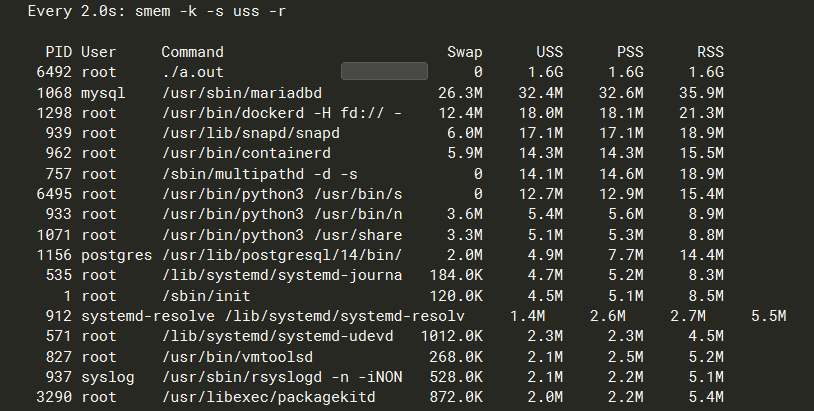一 前言
对于C或C++程序员来说,面对的bug很大部分是内存操作问题,这其中比较令人头疼的就是内存泄漏了,虽然我们有valgrind 和AScan等内存问题的检测工具,但是valgrind每次输出一大堆,AScan有时候看输出结果看的是云里雾里的。再说,谁会嫌弃工具箱里面多个工具那。
二 内存泄漏的一般检查
2.1 基本准备
内存泄漏问题的检查步骤,对于做过c或c++同学都比较熟悉:
- 首先通过top或vmstat 、或smem(本次介绍)等工具查看内存情况,看看是否出现了内存泄漏。
- 其次用pidstat 或top指定进程的方式,观察可以进程内存占用情况。
- 用memleak或gdb工具查看内存泄漏。
先上测试代码:
#include
#include
#include
#include
#define MALLOC_SIZE 256000
int *fibo(int *n0, int *n1)
{
int *v = (int *) malloc(MALLOC_SIZE*sizeof(int));
memset(v, 0, MALLOC_SIZE*sizeof(int));
*v = *n0 + *n1;
return v;
}
void do_test()
{
int n0 = 0;
int n1 = 1;
int *v = NULL;
int n = 2;
for (n = 2; n > 0; n++)
{
v = fibo(&n0, &n1);
n0 = n1;
n1 = *v;
printf("%dth => %lldn", n, *v);
//free(v)
sleep(1);
}
}
int main(void)
{
printf("pid=%dn", getpid());
do_test();
return 0;
}
程序比较简单,编译运行起来:
gcc memtest.c ; ./a.out
2.2 smem工具
这次用下新工具smem,这是一个python写的小工具,可以统计系统中所有进程占用的物理内存RSS、以及去掉共享内存的PSS、以及程序本身的独占内存USS的情况。
安装:
# centos 下
yum install epel-release
yum install smem python-matplotlib python-tk
# ubuntu 下
apt-get install smem
常用命令:
-k 带单位显示内存
root@ubuntu-lab:/home/miao# smem -k
PID User Command Swap USS PSS RSS
1009 root /usr/sbin/cron -f -P 0 304.0K 399.0K 2.9M
1137 root nginx: master process /usr/ 0 196.0K 435.0K 2.1M
931 root /usr/sbin/irqbalance --fore 0 492.0K 655.0K 4.0M
....
-u -k 带单位显示每个用户的内存占用:
root@ubuntu-lab:/home/miao# smem -u -k
User Count Swap USS PSS RSS
systemd-timesync 1 0 764.0K 1.1M 6.7M
messagebus 1 0 924.0K 1.2M 4.9M
systemd-network 1 0 1.7M 2.1M 7.4M
syslog 1 0 3.0M 3.1M 6.2M
www-data 4 0 2.0M 4.2M 22.4M
systemd-resolve 1 0 4.8M 5.8M 12.7M
miao 8 0 11.0M 16.9M 49.1M
postgres 7 0 9.2M 22.0M 74.5M
mysql 1 0 74.0M 74.7M 80.7M
root 30 0 260.7M 284.1M 429.5M
-w -k 显示系统整体内存情况类似free
root@ubuntu-lab:/home/miao# smem -w -k
Area Used Cache Noncache
firmware/hardware 0 0 0
kernel image 0 0 0
kernel dynamic memory 1.5G 1.3G 268.5M
userspace memory 414.0M 191.5M 222.5M
free memory 2.8G 2.8G 0
-k -s uss -r 按照uss的占用从大到小排序的方式展示内存的占用情况 非常实用
root@ubuntu-lab:/home/miao# smem -k -s uss -r
PID User Command Swap USS PSS RSS
1298 root /usr/bin/dockerd -H 0 74.3M 74.5M 77.9M
1068 mysql /usr/sbin/mariadbd 0 74.0M 74.8M 80.7M
939 root /usr/lib/snapd/snapd 0 44.9M 45.0M 46.7M
....
好了基本命令介绍完毕,那我们来看看如何查看内存是否泄漏吧,因为内存泄漏的程序占用的内存是一直再增加的(这不是废话嘛),这样我们就可以用上面的排序命令只观察上面几个进程了。
watch smem -k -s uss -r
小技巧,watch加在命令前面,5s执行一次命令,会高亮显示改变的部分。

2.3 memleak检查
在ubuntu下安装memleak竟然很难安装,我用的是最新的服务器版本,后面在centos下安装后测试的:
[root@xxx]# python2 /usr/share/bcc/tools/memleak -p 160399
Attaching to pid 160399, Ctrl+C to quit.
[17:27:25] Top 10 stacks with outstanding allocations:
5120000 bytes in 5 allocations from stack
fibo+0x1a [a.out]
do_test+0x41 [a.out]
main+0x24 [a.out]
__libc_start_main+0xf5 [libc-2.17.so]
[17:27:30] Top 10 stacks with outstanding allocations:
10240000 bytes in 10 allocations from stack
fibo+0x1a [a.out]
do_test+0x41 [a.out]
main+0x24 [a.out]
__libc_start_main+0xf5 [libc-2.17.so]
[17:27:35] Top 10 stacks with outstanding allocations:
15360000 bytes in 15 allocations from stack
fibo+0x1a [a.out]
do_test+0x41 [a.out]
main+0x24 [a.out]
__libc_start_main+0xf5 [libc-2.17.so]
[17:27:40] Top 10 stacks with outstanding allocations:
19456000 bytes in 19 allocations from stack
fibo 函数出现内存泄漏,把泄漏的字节数都打印了出来,我们改了下代码把free的注释去掉,再用memleak查看等了一会还是没有泄漏信息,说明已经修复了,如下:
[root@xxx]# python2 /usr/share/bcc/tools/memleak -p 165349
Attaching to pid 165349, Ctrl+C to quit.
[17:35:21] Top 10 stacks with outstanding allocations:
[17:35:26] Top 10 stacks with outstanding allocations:
[17:35:31] Top 10 stacks with outstanding allocations:
[17:35:36] Top 10 stacks with outstanding allocations:
三 gdb 查看内存泄漏
也许你对memleak已经很熟悉了,那来看看gdb查看函数的内存泄漏方法吧,这个方法只是查看具体的一个函数是否存在内存泄漏,一定的场景下还是蛮实用的。
把代码中的for (n = 2; n > 0; n++) 改成for (n = 2; n > 0&& n
(gdb) b main
Breakpoint 1 at 0x400739: file memleaktest.c, line 34.
(gdb) r
Starting program: /home/miaohq/testcode/./a.out
Breakpoint 1, main () at memleaktest.c:34
34 printf("pid=%dn", getpid());
Missing separate debuginfos, use: debuginfo-install glibc-2.17-325.el7_9.x86_64
(gdb) call malloc_stats()
Arena 0:
system bytes = 0
in use bytes = 0
Total (incl. mmap):
system bytes = 0
in use bytes = 0
max mmap regions = 0
max mmap bytes = 0
$1 = -136490560
(gdb) n
pid=181977
35 do_test();
(gdb) call malloc_stats()
Arena 0:
system bytes = 0
in use bytes = 0
Total (incl. mmap):
system bytes = 0
in use bytes = 0
max mmap regions = 0
max mmap bytes = 0
$2 = -136490560
(gdb) n
2th => 1
3th => 2
4th => 3
5th => 5
6th => 8
7th => 13
8th => 21
9th => 34
36 return 0;
(gdb) call malloc_stats()
Arena 0:
system bytes = 0
in use bytes = 0
Total (incl. mmap):
system bytes = 8224768
in use bytes = 8224768
max mmap regions = 8
max mmap bytes = 8224768
$3 = -136490560
(gdb) p 256000*4*8
$4 = 8192000
(gdb)
Total (incl. mmap):即本程序占用的总内存,看到明显的增加部分即为未释放的内存,程序使用的内存增加:8224768 稍大于256000*4*8 分配的内存,内存分配需要存储链表还有一些对齐原因所以会多分配些。
free之后的场景:
(gdb) call malloc_stats()
Arena 0:
system bytes = 0
in use bytes = 0
Total (incl. mmap):
system bytes = 0
in use bytes = 0
max mmap regions = 0
max mmap bytes = 0
$1 = -136490560
(gdb) n
pid=183406
35 do_test();
(gdb) n
2th => 1
3th => 2
4th => 3
5th => 5
6th => 8
7th => 13
8th => 21
9th => 34
36 return 0;
(gdb) call malloc_stats()
Arena 0:
system bytes = 1159168
in use bytes = 0
Total (incl. mmap):
system bytes = 1159168
in use bytes = 0
max mmap regions = 1
max mmap bytes = 1028096
$2 = -136490560
(gdb)
in use bytes 为0了。


